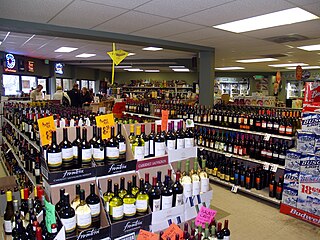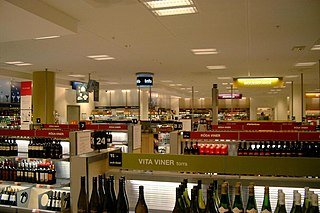
Low-alcohol beer is beer with little or no alcohol content and aims to reproduce the taste of beer without the inebriating effects of standard alcoholic brews. Most low-alcohol beers are lagers, but there are some low-alcohol ales. Low-alcohol beer is also known as light beer, non-alcoholic beer, small beer, small ale, or near-beer.

Liquor is an alcoholic drink produced by distillation of grains, fruit, or vegetables that have already gone through alcoholic fermentation. The distillation process purifies the liquid and removes diluting components like water, for the purpose of increasing its proportion of alcohol content. As liquors contain significantly more alcohol, they are considered "harder" – in North America, the term hard liquor is used to distinguish distilled alcoholic drinks from non-distilled ones.
The three-tier system of alcohol distribution is the system for distributing alcoholic beverages set up in the United States after the repeal of Prohibition. The three tiers are importers or producers; distributors; and retailers. The basic structure of the system is that producers can sell their products only to wholesale distributors who then sell to retailers, and only retailers may sell to consumers. Producers include brewers, wine makers, distillers and importers.

A liquor store is a retail shop that predominantly sells prepackaged alcoholic beverages — typically in bottles — intended to be consumed off the store's premises. Depending on region and local idiom, they may also be called bottle store,off licence,bottle shop,bottle-o,package store,party store, ABC store,state store, or other similar terms. Many jurisdictions have an alcohol monopoly. Prices are usually substantially lower than in bars or pubs.

The Oregon Liquor Control Commission (OLCC) is a government agency of the U.S. state of Oregon. The OLCC was created by an act of the Oregon Legislative Assembly in 1933, days after the repeal of prohibition, as a means of providing control over the distribution, sales and consumption of alcoholic beverages. To this end, the agency was given the authority to regulate and license those who manufacture, sell or serve alcohol. Oregon is one of 18 alcoholic beverage control states that directly control the sales of alcoholic beverages in the United States. In 2014, the passage of Oregon Ballot Measure 91 (2014) legalized the recreational use of marijuana in Oregon and gave regulatory authority to the OLCC.

Purposeful production of alcoholic drinks is common and often reflects cultural and religious peculiarities as much as geographical and sociological conditions.

In the United States, a moist county is a county in between a "dry county" and a "wet county". The term is typically used for any county that allows alcohol to be sold in certain situations, but has limitations on alcohol sales that a normal "wet" county would not have. Some historically "dry" counties are switching to this system to avoid losing money to businesses in other counties, but do not wish to become completely "wet." The term in itself does not have any specific meaning, just that the county is not completely "wet" but is not "dry", either. The terms are applicable in states in which each county makes its own rules on alcohol sales. A "dry" county that contains one or more "wet" cities is typically called "moist".
The New Jersey Division of Alcoholic Beverage Control is an agency of the government of the state of New Jersey that regulates commerce in alcoholic beverages in that state.
Total Wine & More is a large, family-owned, privately held American alcohol retailer founded and led by brothers David Trone and Robert Trone. Total Wine & More was named Retailer of the Year by Market Watch in 2006, Beverage Dynamics in 2008, and Wine Enthusiast Magazine in 2004 and 2014. The company is headquartered in North Bethesda, Maryland.

An alcohol monopoly is a government monopoly on manufacturing and/or retailing of some or all alcoholic beverages, such as beer, wine and spirits. It can be used as an alternative for total prohibition of alcohol. They exist in all Nordic countries except Denmark proper, and in all provinces and territories in Canada except Alberta. In the United States, there are some alcoholic beverage control states, where alcohol wholesale is controlled by a state government operation and retail sales are offered by either state or private retailers.
The Virginia Alcoholic Beverage Control Authority is one of the eleven public safety agencies under the Secretariat of Public Safety and Homeland Security for the Commonwealth. The agency administers the state's ABC laws with an emphasis on public service and a focus on protecting citizens by ensuring a safe, orderly and regulated system for convenient distribution and responsible consumption of alcohol.

An alcoholic drink is a drink that contains ethanol, a type of alcohol produced by fermentation of grains, fruits, or other sources of sugar. The consumption of alcohol plays an important social role in many cultures. Most countries have laws regulating the production, sale, and consumption of alcoholic beverages. Some countries ban such activities entirely, but alcoholic drinks are legal in most parts of the world. The global alcoholic drink industry exceeded $1 trillion in 2018.

The U.S. state of Oregon has an extensive history of laws regulating the sale and consumption of alcoholic beverages, dating back to 1844. It has been an alcoholic beverage control state, with the Oregon Liquor Control Commission holding a monopoly over the sale of all distilled beverages, since Prohibition. Today, there are thriving industries producing beer, wine, and liquor in the state. Alcohol may be purchased between 7 a.m. and 2:30 a.m. As of 2007, consumption of spirits is on the rise, while beer consumption is holding steady. Also, 11% of beer sold in Oregon was brewed in-state, the highest figure in the United States.

Alcohol laws are laws in relation to the manufacture, use, being under the influence of and sale of alcohol or alcoholic beverages that contains ethanol. Common alcoholic beverages include beer, wine, and distilled spirits. The United States defines an alcoholic beverage as, "any beverage in liquid form which contains not less than one-half of one percent of alcohol by volume", but this definition varies internationally. These laws can restrict those who can produce alcohol, those who can buy it, when one can buy it, labelling and advertising, the types of alcoholic beverage that can be sold, where one can consume it, what activities are prohibited while intoxicated, and where one can buy it. In some cases, laws have even prohibited the use and sale of alcohol entirely, as with Prohibition in the United States from 1920 to 1933.
Blue laws, also known as Sunday laws, are laws designed to restrict or ban some or all Sunday activities for religious reasons, particularly to promote the observance of a day of worship or rest. Blue laws may also restrict shopping or ban sale of certain items on specific days, most often on Sundays in the western world. Blue laws are enforced in parts of the United States and Canada as well as some European countries, particularly in Austria, Germany, Switzerland, and Norway, keeping most stores closed on Sundays.

The production of distilled spirits in New Jersey has not been a large industry in the state. Strict alcoholic beverage control laws in place during and after Prohibition (1919-1933) prevented the industry from growing for almost a century. In 2013, the state passed a law creating a craft distillery license. and issued the first new distillery license since Prohibition to Jersey Artisan Distilling













